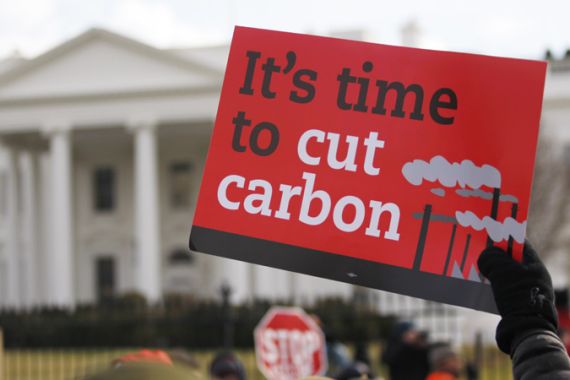Canada presents sustainable jobs bill for green transition
Long-awaited bill aims to help train workers for new roles in a future green economy, and attract investment dollars.

The Canadian government has presented a sustainable jobs bill intended to prepare workers for a transition to a lower-carbon economy following years of consultation and opposition from Alberta, Canada’s main fossil-fuel producing province.
Canada, the world’s fourth-largest oil producer and sixth-largest natural gas producer, has aimed for a 40 percent to 45 percent reduction in emissions by 2030 and net zero by 2050.
Keep reading
list of 4 itemsWhat could a possible prison sentence for Donald Trump look like?
US government agencies hit in global hacking spree
US groups celebrate first Muslim woman to serve as federal judge
Prime Minister Justin Trudeau’s Liberal Party government hopes the sustainable jobs legislation will help train workers for new roles in a future green economy, and attract billions of dollars in investment by creating a skilled clean energy workforce.
“Canada is executing its plan to become the clean energy and technology supplier of choice in a net-zero world,” Natural Resources Minister Jonathan Wilkinson said in a statement on Thursday.
The legislation is built on Canada’s sustainable jobs plan, which was released in February and will likely become law early next year.
It includes creating a partnership council to advise the government on job creation and supporting workers, publishing an action plan every five years and establishing a sustainable jobs secretariat to ensure coherent policies across federal departments.
Once passed, the legislation would also hold future governments to account with respect to supporting Canada’s workers by putting in place structures, guidelines, and accountability mechanisms, the government said in a statement.
How can workers get a ‘just transition’ amid the climate crisis?
Trudeau has been promising sustainable jobs legislation since 2019, but the concept – also called a “Just Transition” – became a lightning rod for criticism, especially in Alberta where Premier Danielle Smith, a member of the Conservative Party, has accused Trudeau of seeking to phase out the oil and gas sector.
Smith said there should be multiple Alberta government appointments to the advisory council, and warned her government would not recognise the legitimacy of any recommendations that interfere with the province’s jurisdiction over its natural resources or energy workforce regulation.
“Alberta will not recognize, cooperate with or enforce any attempt to phase out our province’s oil and gas industry or its workforce,” Smith said in a statement.
The federal Conservative Party criticised the legislation as “anti-energy”, and said it would hurt the economy and make life more expensive for Canadians.
Laura Cameron, a policy adviser for the International Institute for Sustainable Development, said that the bill was welcome but that there needed to be a clearer link in the body of the legislation between sustainable jobs and Canada’s climate goals.
“We need to ensure these jobs are sustainable and are reducing emissions and advancing climate action,” Cameron said. “Without that link … we risk pursuing job creation in industries that aren’t actually moving us in the right direction.”